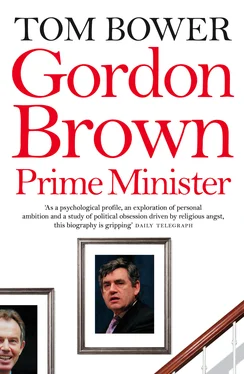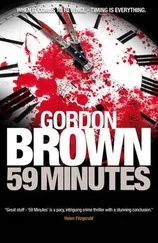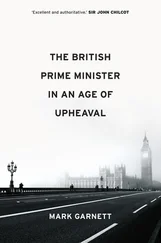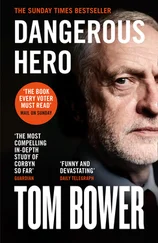Early on Friday morning he arrived at the Labour headquarters at Millbank. On the coffee table at the entrance was a pile of newspapers clearly marked ‘Do Not Remove’. Grabbing the papers, he brushed past the receptionists without a smile and rushed to his office. The newspapers were discouraging. Others had followed the Evening Standard ’s prediction of Blair’s success. A poll of Scottish MPs in the Scotsman showed that a majority opposed Brown. His friends would subsequently claim that the poll was fixed by Mandelson, but the tilt was certainly accurate. The comparisons unflatteringly mentioned Brown’s lacklustre performances in the Commons and Blair’s superior mental agility. English socialists, it was reported, had had enough of the Scots and the Welsh.
Those criticisms, Brown believed, would not determine the outcome of the leadership election. Under Labour’s constitution, the votes of the MPs, the trade unions and the constituencies were of equal value, and the outcome was still uncertain. The question was whether he was prepared to fight. He still hoped to gain the backing of Peter Mandelson, whose unrivalled ability, proven over the past seven years, would enhance his candidacy. He could also rely on Charlie Whelan, whose voice was heard in a neighbouring room. Using two swear words where one would have been more than sufficient, Whelan was phoning journalists, urging them to understand that Brown would win the leadership. Nearby, Nick Brown, inexplicably wearing sunglasses, nodded his agreement although he had not yet contacted any allies in the trade unions or constituencies. Inside his office, Gordon Brown sat depressed.
Over the weekend he returned as usual to Scotland. His first call was on Elizabeth Smith, the former leader’s widow. Helen Liddell, the party’s former secretary, was outside the house waiting to give a television interview as he arrived. Tony Blair, Liddell noted, had not yet crossed the border to pay his respects.
The weekend’s newspapers did not improve Brown’s self-confidence. Their opinion polls showed that Blair was the favourite in the party and the country. Brown, it was implied, might withdraw on the basis of a prior agreement with Blair not to stand against each other. Brown called the party’s pollster Philip Gould and asked who was the favourite to win. ‘ I said Tonywithout hesitation,’ Gould recalled. ‘Gordon asked me why, and I replied that Tony not only met the mood of the nation, he exemplified it. He would create for Britain a sense of change, of a new beginning, which Gordon could not do.’ More irritating was Mandelson’s appearance on Channel 4 News describing his ideal candidate as the person ‘who would fully maximise support for the party in the country’.
Brown was stewing, and his mood worsened the following morning, Monday, 16 May, when a letter from Mandelson, setting out the position as he saw it, was delivered to Brown’s office on the other side of the corridor. Brown, said Mandelson, was attracting sympathy from the lobby for his position, not least because of his unrivalled intellectual position, but he had a problem in not appearing to be the front-runner. The conclusion was painful. If Brown ran it would be a gift to the party’s enemies, and he would be blamed by the media for creating the split. The remedy would be intensive briefings to sell himself, wrote Mandelson, but the regrettable consequence of that would be to weaken Blair’s position. Even then, success could not be guaranteed. Ultimately, the card the media were playing for Blair was his ‘southern appeal’.
Mandelson may have been stating the obvious in unpartisan words, but to Brown, coiled like a spring in his lust for power, the truth was intensely hurtful. He regarded the weekend’s media analysis, the suggestion of an agreement between himself and Blair, and Mandelson’s letter as calculated to undermine his chances. ‘We’ve been betrayed,’ he muttered to a friend. He also suspected that Mandelson was helping Blair, and encouraged Tribune to report the alliance. Blair was alarmed by that possibility and directed Anji Hunter and later Michael Meacher to telephone the editor Mark Seddon. ‘It’s simply not true,’ Hunter exclaimed. The newspaper did not publish the accurate story.
Four days after John Smith’s death, the message was ‘Brown in mourning’, but the reality was also of a politician fretting. Brown required a bandwagon if he was to win the prize. Mandelson’s judgement was unfortunate but not necessarily decisive if Brown actively campaigned for support, seeking out and converting dissenters. Secluded in his office, he relied on an inner circle of MPs – Nick Brown, Doug Henderson, Andrew Smith, Nigel Griffiths and Eric Clarke, the former leader of the Scottish miners – for advice. He never paused to contemplate the possibility that outsiders might dislike a Scottish clique as much as he disdained the London establishment. Nor did he recognise how the personal weaknesses of his political advisers reflected poorly on himself. ‘Tell me what you think,’ Brown said to Henderson, who had been tramping around Westminster. ‘I don’t think you can win,’ reported his ambassador, knowing that Brown’s two brothers were urging him to stand.
While Brown hesitated, Blair, encouraged by a personal message from David Ward that Brown had not been John Smith’s favourite son, was actively seeking support. Chris Smith, David Blunkett, Adam Ingram, the MP for East Kilbride, and Frank Dobson each expressed their support. Brown was shocked. Dobson, he had thought, would favour his redistributive socialism. Instead, Dobson complained that rather than encourage consensus government, Brown would cluster his favourites around himself. ‘ He’s an iceman,’ was the hurtful quotation. Brown was perplexed that even his assumption of Neil Kinnock’s endorsement was wrong. The former leader wondered aloud about Brown’s suitability. He was a bowler, not a batsman, suggested Kinnock. Not surprisingly, Charles Clarke, Kinnock’s chief of staff, was telling everyone that he had telephoned Blair immediately after Smith’s death to urge him to run for the leadership. Presentation and personality rather than politics was the issue. The party was desperate for an election victory. Blair may have been too right-wing for many in the party, but he was likely to appeal to the English middle class.
Конец ознакомительного фрагмента.
Текст предоставлен ООО «ЛитРес».
Прочитайте эту книгу целиком, купив полную легальную версию на ЛитРес.
Безопасно оплатить книгу можно банковской картой Visa, MasterCard, Maestro, со счета мобильного телефона, с платежного терминала, в салоне МТС или Связной, через PayPal, WebMoney, Яндекс.Деньги, QIWI Кошелек, бонусными картами или другим удобным Вам способом.












